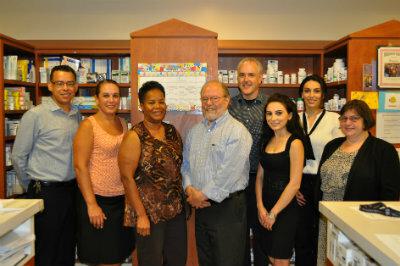Honoring Our Own on World Pharmacists Day


Honoring Our Own on World Pharmacists Day

On September 25th pharmacists all over the world will be celebrated in honor of World Pharmacists Day. This year’s theme is Pharmacists: Caring for You. The theme reflects the important role of pharmacists in providing care to the public and to highlight the emotional connection they have with their patients.
Among the unique and innovative services offered at the Los Angeles Jewish Home is an in-house pharmacy. Located in the Joyce Eisenberg-Keefer Medical Center (JEKMC) at Grancell Village, the Erwin Rautenberg Foundation Pharmacy plays a critical role in the lives of our seniors and the exceptional care they receive.
“It’s uncommon to have a pharmacy located in a nursing home,” says Bob Shmaeff, director of pharmacy services. “Proximity to our patients is a big advantage. We can deliver medications on a moment’s notice. It’s a full-service pharmacy geared to the needs of our seniors.”
The in-house pharmacy provides its staff the opportunity to review orders, confirm dosages, make sure medications are having the intended effects, and check for drug interactions and adverse drug reactions. “Because our pharmacy is located within JEKMC, our staff can visit with residents and establish one-to-one relationships. This helps create a connection and build trust. Our seniors know they can approach us at any time to share how they are feeling and ask any question they may have about their medications.”
“Bob and his team have been the recipients of several awards,” says Dr. Noah Marco, chief medical officer of the Jewish Home. “They participate in quality improvements efforts and mentor pharmacists that are completing their training. More importantly, our pharmacists make a difference in the lives of our residents by making sure each and every one receives the correct medication at the correct dose. They also ensure the resident’s doctor is aware of any potential safety issues regarding the prescriptions they write. Our residents love living at the Home, and our skilled pharmacists are a big part of the reason.”
Jerry Wahagheghe, director of nursing at JEKMC, shares Dr. Marco’s enthusiasm about the in-house pharmacy and its team. “It’s wonderful because there is no need to order medications from an outside pharmacy, which saves a great deal of time. Bob and his staff are amazing.”
“What I love most about my job at the Erwin Rautenberg Foundation Pharmacy is the ability to help our seniors live long, purposeful lives,” says Bob. “My staff and I have one goal: to deliver high quality pharmaceutical care to our residents. The end result is an average life span of 91 years at the Jewish Home, which is truly an accomplishment and a measure of success.”
We honor our amazing pharmacy staff who play a major role in providing high quality care to our seniors:
Robert Shmaeff, MPA Director of Pharmacy Services
Sean Boucher, PharmD Staff Pharmacist
Janice Hoffman, Pharmacist, PharmD Faculty in Residence Western University
Mariam Khachatryan, PharmD Pharmacist Resident
Ani Aramyan, PharmD, BCPS, CGP, Pharmacist for the Brandman Center
April Gonzalez, Technician
Henry Camas, Technician
Kathy Cardona, Technician
Jae Crawford, Biller/Technician